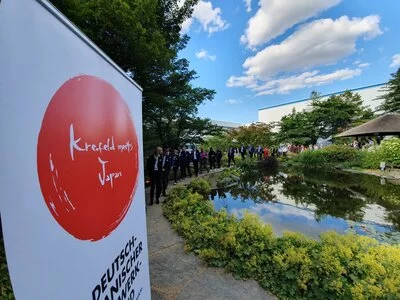180 guests learn about trends, technologies and free trade
German and Japanese companies have a lot in common, despite great differences in culture and language. “Values like reliability and stability play a big role in both countries,” said Masato Iso, Consul General of Japan in Düsseldorf, during the welcome address of ‘Krefeld meets Japan’. “Longstanding and stable management is more important to us than short-term profit maximisation.” To consolidate the German-Japanese relations within the region, the Chamber of Industry and Commerce Mid-Lower Rhine district organised a networking evening. The event was held in cooperation with the city of Krefeld and the Standort Niederrhein GmbH and was hosted at the Okuma Europe GmbH premises in Krefeld Fichtenhain. The Japanese-German Business Association (DJW) was the cooperation partner of the event, which was fully booked with 180 guests.
“The companies in the Lower Rhine area earn every second euro abroad,” explained IHK president Elmar te Neues, who participated in the welcome talk together with Iso and Krefeld’s mayor Frank Meyer. “It is therefore consequential to concern ourselves with attractive foreign markets. This is where Japan comes in. We already have excellent relations with the country.” Around 70 Japanese companies are based in the IHK district. Many of them have been there for a long time, for instance Okuma Europe GmbH. The CNC machine manufacturer was one of the first Japanese companies to settle in Krefeld 30 years ago. “I am convinced that Krefeld is very interesting for Japanese companies,” said mayor Frank Meyer. He visited several company headquarters in Tokyo last year. “Affordable properties, attractive commercial areas and the proximity to Düsseldorf Airport with direct connections to Tokyo stand out as our locational advantages. They serve as good arguments for doing business in Germany and Europe from Krefeld.”
Gerhard Wiesheu, chairman of the DJW board, gave a kick-off speech titled “Artificial Intelligence, Robotics and Co – Motivating forces for German-Japanese Business Cooperations?” He highlighted the opportunities that such cooperation offers for German and Japanese companies, in particular regarding the EU’s new free trade agreement with Japan, JEFTA (Japan-EU Free Trade Agreement). “The free trade treaty holds great potential,” said Wiesheu, “In terms of business with end customers in the technological sector, we may have lost the battle against the USA and China. However, both Japan and Germany are leaders in the field of Industry 4.0. Together, they can further extend this lead.” For this, the EU and Japan should set their own technology standards as a common economic area and thus intensify their cooperation. “Germany will moreover most likely benefit from Brexit, since many Japanese companies invest in Germany to prepare for a hard Brexit.”
The subsequent table talk also concerned the topic “Trends, Technologies and Free Trade – Chances for Businesses”. Participants were Christina Bäumer (Sales Manager at the medical technology producer Hager & Meisinger in Neuss), Prof. Klaus Juffernbruch (FOM Hochschule für Ökonomie & Management, University of Economics and Management), Norbert Teeuwen (COO Okuma Europe GmbH) and Gerhard Wiesheu. The business representatives reported on their experiences in Japan and Germany. “It is indeed a challenge to adapt to the Japanese culture and language,” said Bäumer, “And sometimes it takes a lot of time until trade partners say ‘Yes’ to a deal. Yet then, they do everything to make it a successful deal.” Juffernbruch pointed out how Germany can learn from Japan’s ageing society. “In their demographic development, the Japanese are 20 years ahead of us,” he explained, “In contrast to us, though, they do not import nursing staff from abroad but rely on Artificial Intelligence in this area.” Politicians are also said to recognize the importance of a stronger cooperation between Germany and Japan. “The framework conditions are really good,” Bäumer reported, “Japan is a highly modern and innovative market – and it increasingly opens up to foreign companies.”
